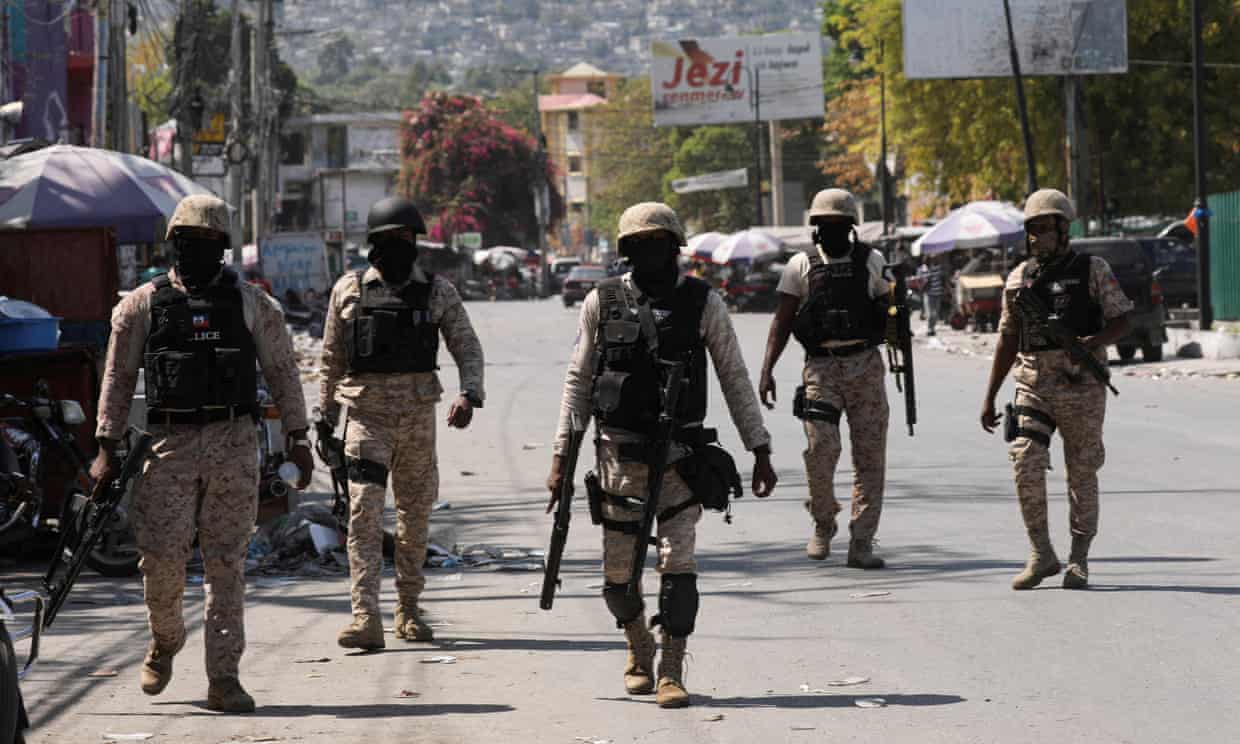Officials say marines deployed for night-time evacuation amid intense fighting in Port-au-Prince
The US has reportedly started airlifting embassy staff out of Haiti under the cover of darkness after dozens of heavily armed gang fighters tried to seize the political quarter of its capital, Port-au-Prince.
The German foreign ministry meanwhile said its ambassador joined other EU representatives in leaving for the Dominican Republic on Sunday.
Haiti’s gangs began an offensive to topple the government on 29 February, storming and ransacking police stations, prisons and hospitals and laying siege to strategic locations, including the port and airport.
The prime minister, Ariel Henry, who was out of the country when the rebellion began, has found himself stranded in Puerto Rico, with one US official warning last week that his unpopular government could fall “at any time”.
The gang insurrection intensified late on Friday as dozens of criminals converged on Champ de Mars, a palm-dotted downtown area of Port-au-Prince that is home to government ministries, embassies, consulates, banks and hotels, as well as Haiti’s supreme court and official presidential residence.
Gang members reportedly torched the interior ministry, which was built after the 2010 earthquake that destroyed much of the capital, and opened fire on the presidential palace before being pushed back by troops.
“If the Champ de Mars falls … it’s the end,” one police officer warned in an interview with the AyiboPost news website.
The newspaper Le Nouvelliste said the gangs had launched a “systematic operation” to drive police from the strategic heart of Port-au-Prince. “Downtown Port-au-Prince has fallen; there is no doubt about it any more,” the newspaper reported on Saturday morning alongside a photograph of a burnt-out police station.
Lionel Lazarre, the head of the national union of Haitian police officers, told the AyiboPost his colleagues were struggling to withstand the onslaught. “The police are on their knees,” he said.
On Sunday, the Miami Herald said US marines had been flown into Port-au-Prince to reinforce embassy security and evacuate non-essential staff. US defence officials told the newspaper that the middle-of-the-night operation had been conducted via helicopter at the request of the state department.
A German foreign ministry spokesman told AFP that “due to the very tense security situation in Haiti, the German ambassador and the permanent representative in Port-au-Prince left for the Dominican Republic today together with representatives from the EU delegation”, adding that they would work from there “until further notice”.
Haiti’s security situation has progressively deteriorated since Henry became prime minister and acting president after the 2021 assassination of Jovenel Moïse. Since then, politically connected gangs who make their money from kidnapping, drug smuggling and extortion have taken control of more than 80% of Port-au-Prince, with such groups gaining further ground in recent days.
Daniel Foote, the former US special envoy to Haiti, predicted the gangs would “simmer down” if their demand for Henry’s resignation was met.
However, Foote believed the security situation had become so acute that a large international intervention was now the only way to restore order. He said such a mission would need to involve between 5,000 and 10,000 police officers and be led by a major economy with experience in police-capacity building, such as the US, Canada, Britain, France or another EU country.
Foote said the planned UN-backed deployment of 2,000 Kenyan police officers to Haiti would be woefully insufficient. “That’s just a suicide mission, worst case, and a waste of money, best case,” he said.
As the violence intensified over the weekend and Henry’s would-be successors jockeyed for position, the authoritarian leader of El Salvador presented himself as an unlikely saviour. Nayib Bukele has thrown tens of thousands of Salvadorians in jail as part of a hardline crackdown on his country’s gangs that has led to plaudits from members of Latin America’s populist right and Republican politicians in the US.
“We can fix it,” Bukele tweeted on Sunday in response to a post about Haiti by a rightwing blogger. “But we’ll need a UNSC [UN security council] resolution, the consent of the host country, and all the mission expenses to be covered,” Bukele added.
Caribbean leaders will meet in Jamaica’s capital, Kingston, on Monday to discuss the crisis. Last week, the chair of the Caribbean Community (Caricom) group, Guyana’s president, Mohamed Irfaan Ali, said its leaders were determined to help their Haitian counterparts find a political solution.
“The fact that more people have died in Haiti in the early part of this year than in Ukraine must give everyone in Haiti and in the international community serious pause,” Ali said.
